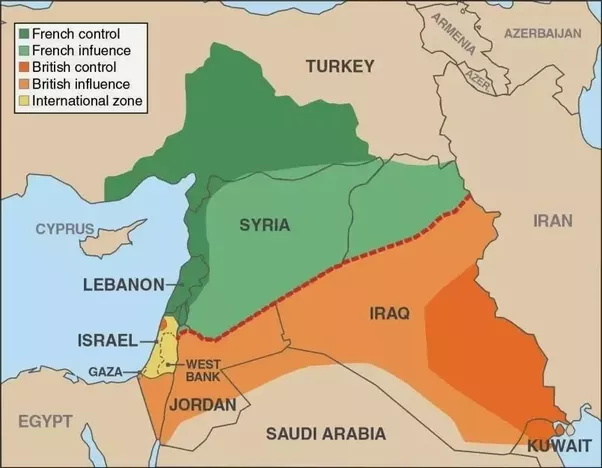Israel-Palestine conflict Explained
The French and the British ended up making contradictory claims to Jews and Arabs during the World War and both sides have clung on to those false promises; That is what the Israel-Palestine conflict is all about.
The detailed mess :
During the world war, France and Britain were jointly tasked with liberating the Levant (the area we now know as Syria, Jordan, Israel and a few surrounding territories). In 1916, Britain and France concluded the Sykes–Picot Agreement, which proposed to divide the Middle East between them into spheres of influence, with "Palestine" as an international enclave.
In 1917, the British promised the Jews an independent homeland in Israel, in exchange for their assistance against the Ottomans, as per the The Balfour Declaration . The area was still under Ottoman rule back then.
In 1926, after the war was over and the Ottomans were long gone, the League Of Nations (what we now know as the UN) passed a resolution known as British Mandate for Palestine which made Britain the custodian of the territory we now know as Israel.
The Mandate terminated on 14 May 1948. Prior to termination, on 29 November 1947, the United Nations General Assembly adopted Resolution 181, which dealt with the future government of Palestine. It envisaged the creation of separate Jewish and Arab states operating under economic union with Jerusalem being transferred to UN trusteeship.
The French got, what was known as the French Mandate (Syria, Lebanon, and a portion of present day Israel).
However, the French also had historical baggage with them.
At the Paris Peace Conference in 1919, Emir Faisal, speaking on behalf of King Hussein, asked for Arab independence, or at minimum the right to pick the mandatory.
After the British mandate of Palestine was obtained, the Vatican, the Italian, and the French governments continued to press their own legal claims on the basis of the former Protectorate of the Holy See and the French Protectorate of Jerusalem.
The Arabs and Jews clung on to the conflicting promises made to them by the various colonial powers during the world war and that conflict has endured.
It’s surprising that a colonial conflict that was created by the British and the French doesn’t get to see the mention of these two powers in common parlance and is portrayed as a religious conflict, much to the delight of the colonial powers. My appeal to anyone who wants to understand the problem is to try to understand the nature of the problem instead of getting caught up in legal claims and counter-claims, which only represent the symptoms of the problem.
The Palestine conflict is similar to the Kashmir conflict (where there were British officers fighting on both sides of what came to be later accepted as the LOC). Both, the Palestine conflict and the Kashmir conflict are not natural conflicts arising out of long standing religious disagreements as the British would like the world to think.
These fault lines were engineered by the British as a premise to intervene in the conflicts at a later stage and re-exert British influence on their former colonies even after the official dismantling of the colonial empire. That is why these conflict zones are still ‘hot’. Every time there is an effort at rapprochement, the British play a counter-balancing role to make sure that the conflict remains unresolved and that the situation perpetually remains on the boil but doesn’t spill over in favor of any one side.
The guy who negotiated the Israel-Palestine boundaries and engineered the conflict, McMohan, is the same guy who drew the McMohan line which happens to be a cause of conflict between India and China today. These are not unintended consequences. This was deliberate. The granting of autonomy to Hong Kong within China was similarly motivated.
The recent British disagreement about the US’s move to recognize Jerusalem as the capital of Israel are an extension of the same colonial mindset which has created and sustained the problem for so long. They have no jurisdiction in a foreign land, but they have taken it upon themselves to play judge there. That is the nature of the drug of colonial overhang, once you are addicted, it’s not easy to stop poking one’s nose in other nation’s affairs even though their own country is grappling with separatism in Scottland, Falklands, and Brexit.
Legal Citations :







Comments
Post a Comment